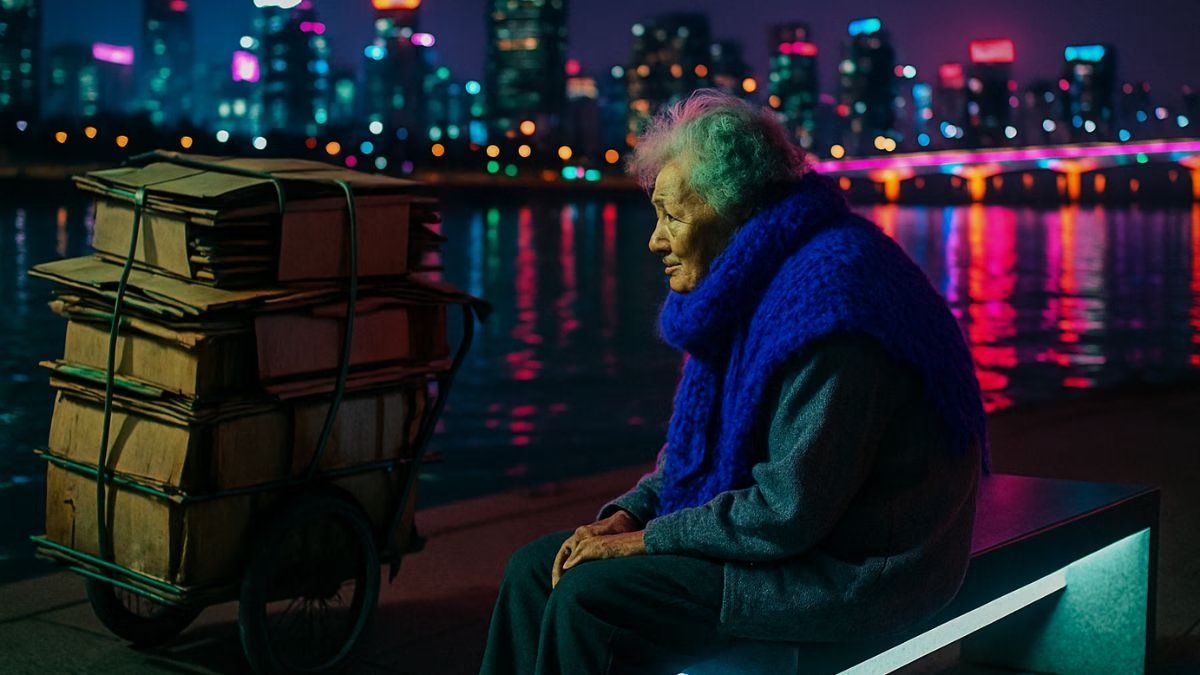The wind off the Han River did not just blow; it sliced. It cut through the layers of Min-ji’s mismatched clothing—the quilted vest found in a donation bin, the two sweaters worn one over the other, the nylon windbreaker that rustled with every step.
Min-ji was seventy years old, and her spine was permanently curved, shaped by the weight of the handcart she pulled behind her. The cart was stacked high with flattened cardboard boxes, secured with fraying bungee cords. To the commuters rushing past her on the riverside path, she was just part of the city’s infrastructure, a moving silhouette of brown corrugated paper.
She stopped near a cluster of smart benches. Seoul was a city of miracles, she often thought. A city where benches were heated by electricity, offering a free, warm embrace to anyone who sat down.
Min-ji parked her cart carefully, locking the wheels with a stone she kept in her pocket. She sat down, letting out a long, rattling breath as the heat from the seat seeped through her trousers, thawing the ice in her hips.
She rubbed her hands together. Her knuckles were swollen, the skin cracked and stained with the gray dust of the city streets. She looked out at the dark water of the Han, reflecting the neon veins of the skyscrapers on the opposite bank. It was Christmas Eve, a fact she knew only because the coffee shops were playing jazz versions of carols and the young couples walking by were holding hands, their faces illuminated by the glow of smartphones.
“Halmoni?”
Min-ji didn’t look up immediately. People rarely spoke to her unless she was blocking the sidewalk.
“Grandmother?”
She turned. A young man was standing there. He wore a long, padded coat that looked like a sleeping bag, and a university scarf wrapped around his neck. He was holding out a crisp 10,000 won bill.
Min-ji stared at the money. It was enough for a hot meal. It was enough for a pair of warm socks.
She stiffened, her chin lifting. “I am not a beggar,” she said, her voice raspy but firm. “I work. I have my cart.”
The boy blinked, surprised. He lowered his hand, embarrassed. “I… I didn’t mean to offend. It’s just cold.”
“The cold is free,” Min-ji said, turning back to the river. “Keep your money.”
Most people would have walked away. They would have shoved the bill back in their pocket, muttered about ungrateful old women, and hurried on to their warm apartments. But this boy didn’t leave. He stood there for a moment, shifting his weight, and then, to Min-ji’s surprise, he sat down on the bench next to her.
“It is cold,” he admitted, pulling his knees up. “My name is Jun-ho.”
Min-ji glanced at him sideways. “You should be with your family, Jun-ho. Not sitting with a cardboard collector.”
“My family is in Busan,” he said. “I’m stuck here for exams.”
He didn’t ask about the cardboard. He didn’t ask why she was out on Christmas Eve. Instead, he pointed to the lights reflecting on the water. “The water looks like ink tonight,” he said.
Min-ji looked. “No,” she corrected softly. “Not ink. Indigo.”
“Indigo?”
“Jjok-bit,” she said, using the old word. “The color of the deep sea. The color of the night sky before the moon rises.” She paused, her gloved fingers tracing the shape of her knee. “I had a Hanbok that color. When I was a bride. It was silk, dyed with real indigo. It shimmered like the river does now.”
She hadn’t thought about that dress in years. She remembered how it felt—light, cool, elegant. A stark contrast to the heavy, scratchy layers she wore now. That young woman in the indigo silk felt like a stranger, a character from a story she had once read.
“It must have been beautiful,” Jun-ho said quietly.
“It was,” Min-ji whispered. “I was beautiful, once.”
They sat in silence for a while longer, sharing the warmth of the electric bench. Then, Jun-ho checked his watch. He stood up and bowed. “Stay warm, Halmoni.”
Min-ji watched him go. She felt a pang of loneliness, sharper than the wind. It was the danger of conversation; it cracked the shell you built around yourself.
She waited another ten minutes, absorbing the last of the heat, before standing up to unlock her cart. She had to get the cardboard to the recycling center before it closed.
“Wait!”
She turned. It was Jun-ho. He was running back down the path, breathless, his breath pluming in the air. He wasn’t holding money this time. He was holding a shopping bag from a nearby department store.
He stopped in front of her, his cheeks flushed. “I know you don’t want money,” he panted. “But you can’t refuse a gift. It’s bad luck to refuse a gift on Christmas.”
He reached into the bag and pulled out a scarf.
It wasn’t a cheap, thin thing. It was thick, soft wool, long enough to wrap around twice. And it wasn’t black or gray, the colors of the street.
It was indigo. Deep, rich, vibrant indigo.
Min-ji stared at it. Her breath caught in her throat. He hadn’t just seen an old woman who needed charity. He had listened. He had heard the story of the bride she used to be.
“I…” Min-ji started, but her voice failed her.
Jun-ho didn’t wait for her to argue. He stepped forward and gently looped the scarf around her neck, tucking the ends in so the wind couldn’t get through.
“It matches your history,” he said with a smile.
Min-ji raised a hand to touch the wool. It was soft against her weathered skin. It felt like dignity. It felt like being remembered.
“Thank you,” she whispered, and this time, she didn’t look away.
Jun-ho bowed again and turned to leave, walking back into the city lights. Min-ji stood there for a long time, her hand clutching the indigo wool. She turned back to her cart and gripped the handles. The load was just as heavy as before, and the wind was just as sharp, but as she began to pull, Min-ji walked with her head a little higher, wrapped in the color of queens.
A Prayer for the Royal Colors
Let us speak now to the ghosts of who we used to be, hovering just above the surface of who we have become. Let us speak to the vibrancy buried under the gray.
To the woman pushing the cart who was once a bride in silk. To the man on the corner who was once a father, a builder, a dreamer. To the layers of dust and survival we wear like armor, hiding the indigo, the crimson, the gold that still lives in our memories. We are all museums of our own history, but the world only looks at the peeling paint on the outside and calls it ruin.
Let us confess the shallow truth to one another: We are quick to see the need, but slow to see the person. We see the hunger, and we offer bread. We see the cold, and we offer wool. These are good gifts, yes. But they are gifts for a body, not for a soul. We forget that the person shivering on the bench has a favorite song, a childhood fear, a color that makes their heart ache with nostalgia. We forget that before they were a problem to be solved, they were a protagonist.
Let us ask for the grace to listen before we give. To sit on the bench, even when the wind is cutting, and ask the question that matters more than “Are you hungry?” Let us ask: “Who were you before the winter came?”
May we have the humility to realize that our charity is often a way of keeping our distance. We give the coin so we do not have to give our time. We give the blanket so we do not have to feel the chill of their story.
But let us strive for a deeper generosity. The generosity of the specific. The generosity of the indigo scarf. The gift that says: I heard you. I saw the bride you were. I see the queen you still are.
Let us honor the invisible crowns worn by those the world calls broken. Let us remember that dignity is not something we bestow upon others; it is something we recognize in them. It is already there, waiting for the light to hit it at the right angle.
So, let us look past the cardboard and the grime. Let us look until we see the shimmer of the deep sea, the flash of the wedding silk, the spark of the life that persists against all odds.
May we be the ones who bring the color back. And may we walk away from the encounter not feeling like saviors, but like witnesses to a beauty that was always there, simply waiting to be wrapped in a warmth worthy of its history.
You are not what you have lost. You are the color you carry.







0 Comments